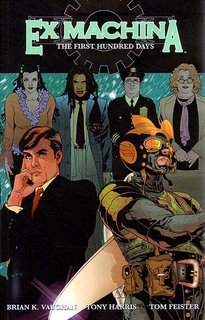Bodies of evidence.

If you haven't yet read the excellent Ex Machina series by Brian K. Vaughan, I really suggest you do. Taut writing, engaging characters and a really interesting concept propel a story that never meanders or bores. Set in a photorealistic post-9/11 New York City, Ex Machina deals with all the typical superheroic themes (power, responsibility, the human capacity for judgment, etc.) in a fresh and dynamic way: the main "superhero" shelves his powers and runs for office after becoming a local hero.
While not an entirely original concept (I think DC's Starman took a similar route back in the day), it's played out amidst the frenetic yet mundane backdrop of municipal politics and it's fascinating to watch a superhero -- a modern-day hero of myth, an archetype usually associated with godlike acts -- earnestly dealing with labour strikes, staffing problems, school vouchers and blizzards that strain the city's infrastructure.
One of my all-time favourite movies is Harold Becker's terrific City Hall (Al Pacino, John Cusack, Bridget Fonda, Danny Aiello) precisely because it, like Ex Machina adeptly mines municipal politics for rich drama and engaging issues.
From AlterNet:
While not an entirely original concept (I think DC's Starman took a similar route back in the day), it's played out amidst the frenetic yet mundane backdrop of municipal politics and it's fascinating to watch a superhero -- a modern-day hero of myth, an archetype usually associated with godlike acts -- earnestly dealing with labour strikes, staffing problems, school vouchers and blizzards that strain the city's infrastructure.
One of my all-time favourite movies is Harold Becker's terrific City Hall (Al Pacino, John Cusack, Bridget Fonda, Danny Aiello) precisely because it, like Ex Machina adeptly mines municipal politics for rich drama and engaging issues.
From AlterNet:
"Local politics has always interested me deeply," Vaughan confides, "especially after living in New York for ten years. It's a lot sexier than politics at the national level. It is less that I have issues that I want to explore than the fact that politics carries so much good drama, and I love a good story. And there were so many of them to be told, when it came to New York's political scene. There are hundreds of superhero books on the markets, but few comics that are political thrillers."
* * *
CBC News is running a provocative news item about one Andrew Stmpson, a British twentysomething who seems to have been cured of AIDS:
A British man's claim to have cleared himself of the virus that causes AIDS has researchers clamouring to run more tests on him.
Andrew Stimpson, 25, tested negative for HIV 14 months after a confirmed positive test. If true, his would be the first documented case of a person purging the virus from the body.
"I think I'm probably one of the luckiest people alive," said Stimpson.
Frankly, the whole story sounds fishy as hell to me, but who knows -- it could turn out to be the beginning of something interesting.
* * *
While Washington tries its best to ignore that pesky Habeas Corpus thingy (hint: fundamental premises need to eroded for longer than four years before you can effectively disappear them), Ottawa is taking a (ever-so-small) step in the right direction by considering a change to the Pinochet-lite secret trials:
Ottawa ponders watchdog for terror trials
Sensitive to criticism of secret proceedings
CHRIS COBB
CanWest News Service
Monday, November 14, 2005
The federal government may introduce legal watchdogs into closed court hearings involving suspected terrorists who are being held indefinitely without trial.
The Ottawa Citizen has learned the compromise move is being pushed by Public Security Minister Anne McLellan in an effort to soften criticism that the secret court process is unfair to defendants and contrary to the traditions of Canada as an open, liberal democracy.
The Martin government is reviewing the law at a time when several countries have expressed concern that security measures introduced after the 9/11 terrorist attacks in the United States are excessive.
British Prime Minister Tony Blair suffered the first parliamentary defeat of his tenure last week when MPs voted against his proposal to introduce stiffer anti-terrorist legislation that would have allowed authorities to hold suspects for 90 days without being charged. The legislation was drafted after the deadly terrorist attacks on the London transportation system in July.
Members of the U.S. Congress are voicing similar concern over the post-9/11 Patriotic Act.
In Canada, the introduction of amicus curiae (friend of the court) will be considered by the cabinet, along with other measures, including an appeal mechanism not available now to those held under security certificates.
"This is a recognition that the process isn't perfect," said a government insider familiar with the process. "Changes are coming soon but these hearings are never going to become open court proceedings. There is too much concern over security for that to happen."
The watchdog's role would be similar to that introduced last year by the inquiry into the arrest and deportation of Syrian-Canadian Maher Arar.
Defence lawyers and defendants will still not be allowed to see secret evidence, or be allowed to know its source, but the court watchdog will be able to give defence teams assurances the government is not simply acting on a whim when it asks for secrecy.
"It's an effort to make the process more fair," the insider said, "but it doesn't mean a backing down on the principle. Some of this information has to remain secret because it is coming from the CIA and other allied security agencies."
McLellan, who has vigorously defended the use of security certificates, is to appear today with Justice Minister Irwin Cotler at a special Senate committee on the Anti-Terrorism Act and at another House of Commons committee hearing on Wednesday.



0 Comments:
Post a Comment
<< Home